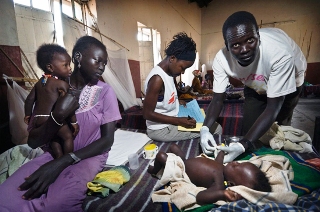MSF criticises donor community for severe lack of medicine in S. Sudan
April 10, 2016 (JUBA) – International donors and the broader humanitarian community must take immediate action to address widespread shortages of essential medicines in South Sudan, Joanne Liu, the international president of Médecins Sans Frontières’s (MSF) said in an open letter.

Nearly two million people have been displaced by the conflict that broke out in South Sudan late 2013, following internal political wrangles within the country’s ruling party.
According to MSF, until June 2015, international donors provided for the funding, procurement and provision of essential medicines in the world’s youngest nation through a mechanism called the Emergency Medicines Fund (EMF).
MSF, however, said despite earlier warnings that withdrawing this support would lead to a dramatic reduction in access to health care, donors decided not to renew the mechanism without implementing an adequate alternative.
“MSF now witnesses shortages of medicines in primary health care centres in a majority of the locations where the organisation works in South Sudan, even in places less affected by conflict,” partly reads Liu’s letter to the donors.
“The medical consequences became evident last year when MSF treated more patients than ever before for severe malaria,” it added.
Lack of medicines at local levels, MSF said, prompted many people to seek treatment due to extreme sick conditions.
Several medical facilities run by government across the country have faced intermittent closures due to drug shortages. In Ezo and Mundri counties of Western Equatoria state, MSF reportedy witnessed or experienced drug shortages or ruptures in every of its medical facilities.
Hundreds of thousands of people remain displaced by conflict in South Sudan, and the drug shortages are compounding the humanitarian needs, the agency stressed.
“A new rainy season is approaching fast, promising new outbreaks as well as complicated logistics,” Liu wrote.
“It is not a situation that one actor can resolve on their own, but concerted efforts seem to be lacking. We are therefore calling upon all donors, actors and authorities again to come together to avert a complete medical crisis which adds to an already dire humanitarian situation”, adds the letter.
MSF operates 17 medical projects across South Sudan, providing assistance to whoever needs it most regardless of race, political affiliation or ethnicity. In 2015, MSF said it provided medical care to over 800,000 people in South Sudan.
(ST)
